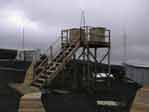More than two years after road access and electrical power to the Mauna Loa Observatory was cut off by lava flows, NOAA staff continue to make critical measurements of the atmosphere and other environmental variables at the remote site.
In 2023, observatory staff installed solar panels at the site and resumed some measurements, including the independent carbon dioxide monitoring programs run by the Global Monitoring Laboratory and Scripps Institution of Oceanography, as well as other atmospheric measurements.
Construction of a temporary road to access the observatory site is anticipated to begin in summer 2025.
Media can contact: Theo Stein (303) 819-7409 (theo.stein@noaa.gov)
Organization(s):
 US Department of Homeland Security
(previously US Department of Energy)
US Department of Homeland Security
(previously US Department of Energy)
What does this program measure?
The Global Fallout Program instituted a global network of sampling sites to determine the global transport and fate of radionuclides released into the atmosphere during the testing of nuclear weapons. In recent years, the program focused on the global deposition of the naturally occurring radionuclides, beryllium-7 and lead-210.
How does this program work?
A funnel attached to an ion-exchange column. The project sampled quarterly at Mauna Loa.
Why is this research important?
Are there any trends in the data?
How does this program fit into the big picture?
What is it's role in global climate change?
Comments and References
This project is no longer active.
Lead Investigator(s):
Dr. Matthew Monetii
212-620-3625
MLO Contact(s):
Darryl Kuniyuki
808-933-6965 (x236)
Web Site(s)
http://www.eml.doe.gov/
databases/fallout
Date Started
January, 1998
RETIRED

